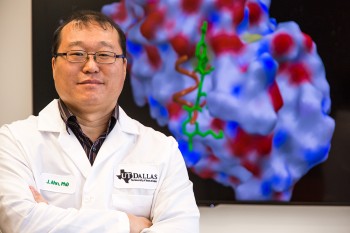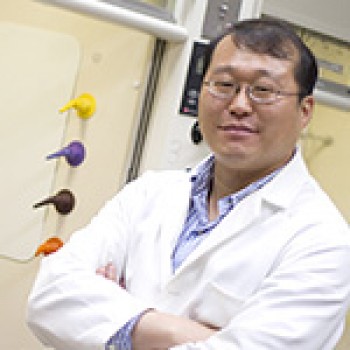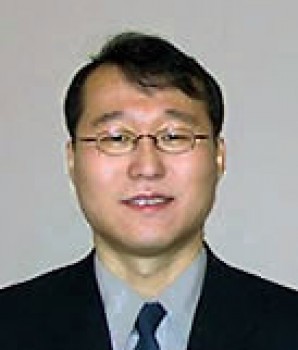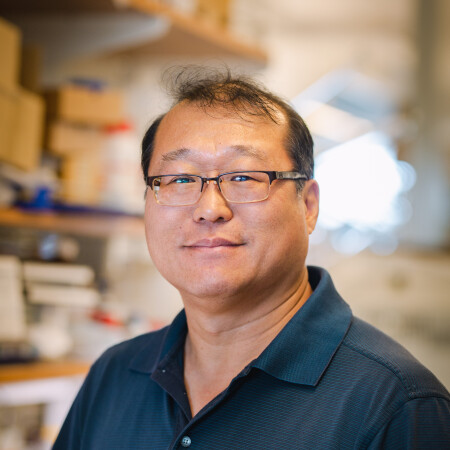Postdoctoral Associate
The Scripps Research Institute - 2004
Professional Preparation
Ph.D. - Chemistry
University of Arizona - 2000
University of Arizona - 2000
M.S.
Seoul National University - 1994
Seoul National University - 1994
B.S.
Seoul National University - 1992
Seoul National University - 1992
Research Areas
Research Description
The central theme of my research is to understand the chemistry and biology of peptides and proteins and to develop new approaches for manipulating these properties with purposefully designed small organic molecules. We employ chemical synthesis and combinatorial chemistry as well as spectroscopic and biophysical methods to accomplish these aims. Projects include:- Rational design of small organic molecules for mimicking protein secondary structures
- Inhibition of key protein-protein interactions in various cancer models
Publications
Topologically Tunable α‐Helix Mimetics for Targeting Protein–Protein Interactions 2025 - Journal Article
Structure–Activity Relationship Study of Tris-Benzamides as Estrogen Receptor Coregulator Binding Modulators 2024 - Journal Article
Evaluating physiochemical properties of FDA-approved orally administered drugs 2023 - Journal Article
Measuring the Enthalpy of an Individual Hydrogen Bond in a DNA Duplex with Nucleobase Isotope Editing and Variable-Temperature Infrared Spectroscopy 2023 - Journal Article
Therapeutic targeting of histone lysine demethylase KDM4B blocks the growth of castration-resistant prostate cancer. 2022 - Journal Article
Targeting LIPA independent of its lipase activity is a therapeutic strategy in solid tumors via induction of endoplasmic reticulum stress. 2022 - Journal Article
Awards
Thieme Chemistry Journal Award - Thieme Verlag [2011]
Siemens Preclinical Image of the Year - World Congress of Molecular Imaging [2010]
Junior Faculty Award - American Diabetes Association [2007]
Bruce W. Erickson Young Investigator’s Award - American Peptide Society [2001]
Mid-Career Fellowship, American Chemical Society - American Chemical Society [1996]
News Articles
UT Dallas Chemist Focuses on Drug-Resistant Breast Cancer
 Dr. Jung-Mo Ahn, associate professor of chemistry and biochemistry at The University of Texas at Dallas, has designed a small molecule that could help breast cancer patients for whom current treatments no longer work. In a paper published recently in the online journal eLife, Ahn and his colleagues describe their approach to designing the molecule as well as experiments that show its effectiveness at stopping the progression of treatment-resistant breast cancer cells in isolation and in an animal model. According to the National Cancer Institute, about 80 percent of breast cancers in women depend on the hormone estrogen to grow. Breast cancer cells in these patients contain proteins called estrogen receptors (ERs) that bind to the hormone and fuel cancer’s growth. For these ER-positive patients, treatment typically takes one of two tracks: drug regimens that stifle the body’s production of estrogen, or drugs that bind to estrogen receptors and block the hormone from attaching. In some patients, however, breast cancer becomes resistant to estrogen-blocking therapy. That happens when estrogen receptors in breast cancer cells mutate and change shape, leaving no place for the drugs to attach. With or without genetic mutations, the receptor still needs to recruit other proteins in the cell, called co-regulators, which promote tumor growth. “Upon estrogen binding, estrogen receptors interact with other proteins like co-regulators to stimulate cancer cell growth,” Ahn said. “Blocking these co-regulators is a new mode of action that could overcome treatment barriers.”
Dr. Jung-Mo Ahn, associate professor of chemistry and biochemistry at The University of Texas at Dallas, has designed a small molecule that could help breast cancer patients for whom current treatments no longer work. In a paper published recently in the online journal eLife, Ahn and his colleagues describe their approach to designing the molecule as well as experiments that show its effectiveness at stopping the progression of treatment-resistant breast cancer cells in isolation and in an animal model. According to the National Cancer Institute, about 80 percent of breast cancers in women depend on the hormone estrogen to grow. Breast cancer cells in these patients contain proteins called estrogen receptors (ERs) that bind to the hormone and fuel cancer’s growth. For these ER-positive patients, treatment typically takes one of two tracks: drug regimens that stifle the body’s production of estrogen, or drugs that bind to estrogen receptors and block the hormone from attaching. In some patients, however, breast cancer becomes resistant to estrogen-blocking therapy. That happens when estrogen receptors in breast cancer cells mutate and change shape, leaving no place for the drugs to attach. With or without genetic mutations, the receptor still needs to recruit other proteins in the cell, called co-regulators, which promote tumor growth. “Upon estrogen binding, estrogen receptors interact with other proteins like co-regulators to stimulate cancer cell growth,” Ahn said. “Blocking these co-regulators is a new mode of action that could overcome treatment barriers.”Small Molecule Could Have Big Impact on Prostate Cancer
 Dr. Jung-Mo Ahn, associate professor of chemistry at The University of Texas at Dallas, has designed and synthesized a novel, small molecule that might become a large weapon in the fight against prostate cancer. In a study published online May 28 in the journal Nature Communications, Ahn and his colleagues at UT Southwestern Medical Center describe the design of the molecule, as well as laboratory tests that show its effectiveness at blocking the cancer-promoting function of proteins called androgen receptors. Androgen receptors are found inside cells and have complex surfaces with multiple “docking points,” where various proteins can bind to the receptor. Each docking point has a unique shape, so only a correctly shaped molecule will fit.
Dr. Jung-Mo Ahn, associate professor of chemistry at The University of Texas at Dallas, has designed and synthesized a novel, small molecule that might become a large weapon in the fight against prostate cancer. In a study published online May 28 in the journal Nature Communications, Ahn and his colleagues at UT Southwestern Medical Center describe the design of the molecule, as well as laboratory tests that show its effectiveness at blocking the cancer-promoting function of proteins called androgen receptors. Androgen receptors are found inside cells and have complex surfaces with multiple “docking points,” where various proteins can bind to the receptor. Each docking point has a unique shape, so only a correctly shaped molecule will fit.
Researcher Lands Grant from Texas Cancer Initiative
 Molecules that attempt to trick cancer cells into killing themselves off are the latest weapons being tested to wage and win the war on cancer. The Cancer Prevention and Research Institute of Texas (CPRIT) has awarded $886,000 to Dr. Jung-Mo Ahn to study a new class of molecules designed to wring the life out of prostate cancer cells. Ahn, an assistant professor of chemistry, is testing compounds called tris-benzamides. Tris-benzamides may coax cancer cells into behaving like normal cells, which eventually allow themselves to die in a process called apoptosis, or programmed cell death. “Cancer cells bypass apoptosis by overproducing anti-apoptotic proteins that block the cells from dying, so they live on and wreak havoc in the body,” Ahn said. “Our tris-benzamides are specially designed to lock into the surface of anti-apoptotic proteins. It gives cancer cells a wake-up call that it’s time to die off.”
Molecules that attempt to trick cancer cells into killing themselves off are the latest weapons being tested to wage and win the war on cancer. The Cancer Prevention and Research Institute of Texas (CPRIT) has awarded $886,000 to Dr. Jung-Mo Ahn to study a new class of molecules designed to wring the life out of prostate cancer cells. Ahn, an assistant professor of chemistry, is testing compounds called tris-benzamides. Tris-benzamides may coax cancer cells into behaving like normal cells, which eventually allow themselves to die in a process called apoptosis, or programmed cell death. “Cancer cells bypass apoptosis by overproducing anti-apoptotic proteins that block the cells from dying, so they live on and wreak havoc in the body,” Ahn said. “Our tris-benzamides are specially designed to lock into the surface of anti-apoptotic proteins. It gives cancer cells a wake-up call that it’s time to die off.”
